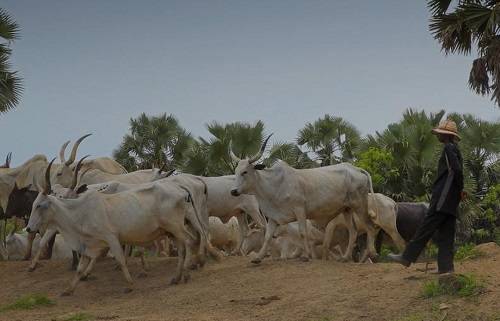Jihadists operating in the subregion of West Africa are now resorting to entering Ghana with stolen animals for sale.
The owners of these stolen animals frequently trace their livestock to regional markets in the country's north, according to officials in the West African nation.
The cattle market at Navrongo, close to Ghana's border with Burkina Faso, is one of the most popular locations for the animals.
Kwesi Adumbila, a reputable cattle trader at the market, told DW that "some of the cattle here are rustled and brought to the market for sale, but we won't know."
"Some even travel across borders with livestock to sell in Ghana. Border crossers have agents they meet in the bush to swap goods and services.
According to Rev. Fr. Clement Aapengnuo, who works with COGINTA, a community peacebuilding NGO sponsored by the EU, the number of markets where these stolen animals are sold is rapidly growing.
"When you look at the cattle markets that are coming up, especially near border towns—II hear a market has just come up in Banda Nkwanta," Aapengnuo said to DW, alluding to a town in the middle of Ghana.
According to Aapengnou, the rustled cattle attract purchasers due to their low market sale prices.
"So, you go there, and they are selling a lot of cattle, and people are enjoying it, thinking this is cheap cattle we can buy and do ABCD, but they don't know that by buying those cattle they are financing that operation, he said.
Armed groups' safe haven for withdrawal
According to a report by the French non-governmental organisation Promediation, which specialises in mediation and negotiation, northern Ghana is a perfect cross-border control and withdrawal zone for armed groups because of its closeness to the Cascades region of neighbouring Burkina Faso and the Ivory Coast.
Some of them seek shelter in Ghana, but the majority of their operations are related to smuggling weapons, narcotics, consumer goods, and livestock.
"They use the money to buy small arms to restock, and then they go back to fight," Aapengnuo added. This furthers the notion that Ghana is a haven for terrorists, which is one of the reasons why the country has not been targeted.
Even livestock that has been robbed from Mali is making its way to markets in Ghana and other West African countries, according to a new study by the Global Initiative Against Transnational Organised Crime on cattle rustling and the conflict economy in Mali.
"Instability and conflict dynamics cannot be separated from the sound of cattle rustling. In fact, it is a good indicator of instability since it denotes the escalation of hostilities and shows the tactics used by armed groups to exert influence or control over particular regions, according to the paper.
Cattle rustling may indicate prospective conflict zones as well as regions where armed groups need resources as they advance farther south and into coastal West African nations, the report continued.
increased border security
In order to address the situation, Ghana's security services have established camps in regions along its northern borders with Burkina Faso, Togo, and the Ivory Coast.
They aim to prevent the spread of terrorism, but because border controls are lax, it is difficult to stop the illegal importation of animals into Ghana.
According to Awal Ahmed Kariam, a security expert whose organisation RISE Ghana has long promoted border security, some Ghanaians' accommodating attitude is encouraging and legitimising criminality.
"Our people have a highly accommodating nature in our culture," he remarked.
"Since individuals are arriving from many jurisdictions, we essentially don't interrogate them. These individuals might include violent radicals; Nevertheless, they are also natives that steal livestock.
Assessments for cattle rustling, according to the Global Initiative, should be "used in early-warning stabilisation operations, as is the case with other types of organised crime."



No comments yet
Be the first to share your thoughts!